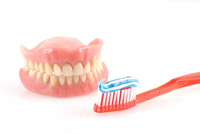Dental Experts Offer Advice For Keeping Your Teeth Forever

Dental experts have offered advice to the public to help them keep their teeth forever. Statistically, people are keeping their natural teeth for longer; however, surveys show that many people still have poor standards of oral hygiene.
According to figures, only 6 per cent of adults were edentate (without teeth) in 2009, compared to 37 per cent in 1968; however, the Adult Dental Health Survey revealed that only 10 per cent of people have excellent oral health and 83 per cent have gum disease.
In light of the figures, dentists from all over the UK have offered tips to keep teeth and gums healthy and strong. Dr Susan Tanner said that the teeth should last forever provided that people brush and floss on a regular basis and attend regular check-ups; patients should also be provided with advice about oral hygiene and healthy eating.
Dr Simon Khoury, a dentist who treats both private and NHS patients in Bath, said that some of his patients do not even have a single filling because they have taken time to look after and care for their teeth and gums every day.
Dentist Dr Will Carter, from the Queensway Dental Clinic, Teesside, said that people should stick to fluoride toothpaste and avoid going for fancy toothpastes; whitening toothpaste can be abrasive, which can damage the surfaces of the teeth and there is little evidence to suggest they whiten the teeth significantly. Dr Jeremy Hill, from the Centre of Dental Excellence in Essex, also said that enamel-building toothpaste is also a waste of money.
Dr Asif Chatoo, an orthodontist from London, said that cleaning the tongue is very important, as bacteria tend to collect in the grooves towards the back of the tongue; tongue scrapers are inexpensive and widely available and they can be particularly useful for people who are prone to bad breath.
Dr Mark Hughes, from the Harley Street Dental Studio, advised patients to avoid mouthwash that contains alcohol and recommends products that contain fluoride.
Join this Discussion










